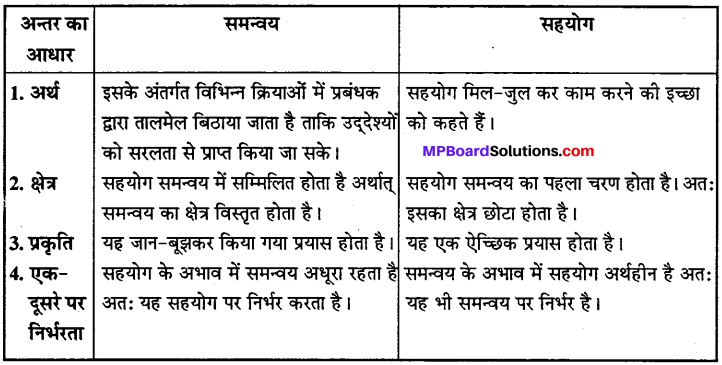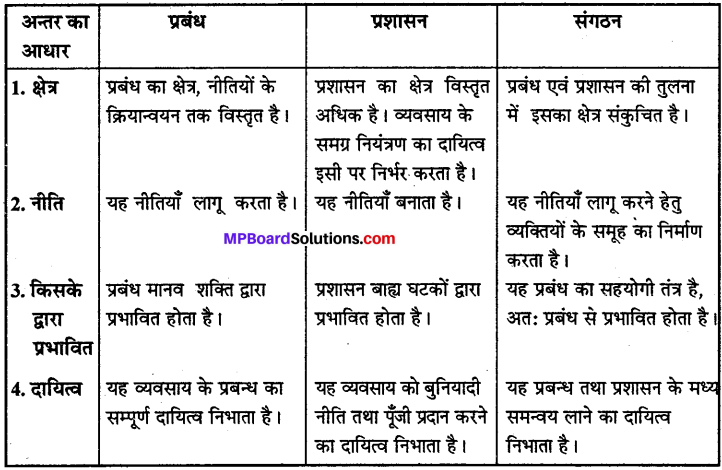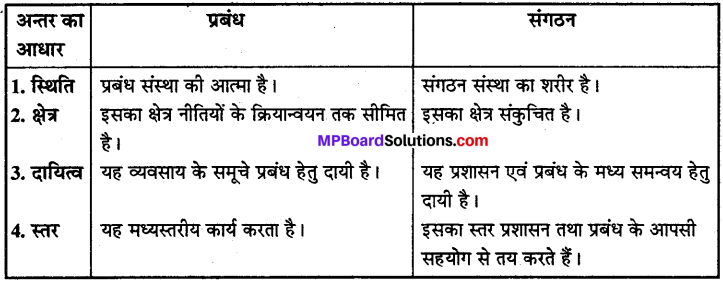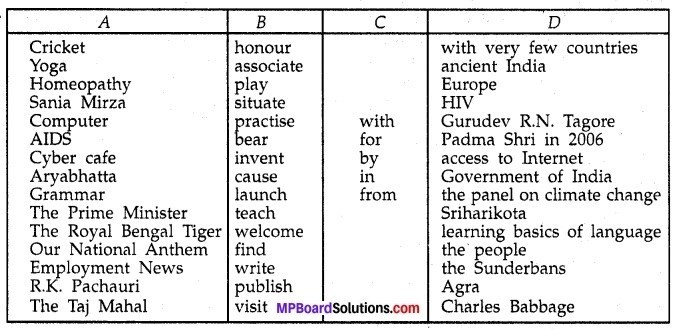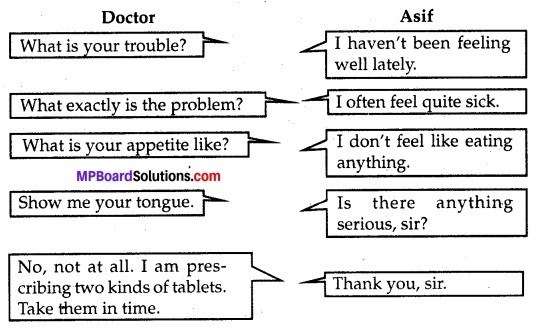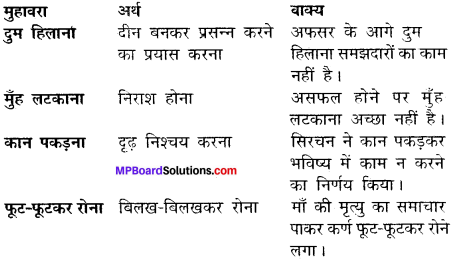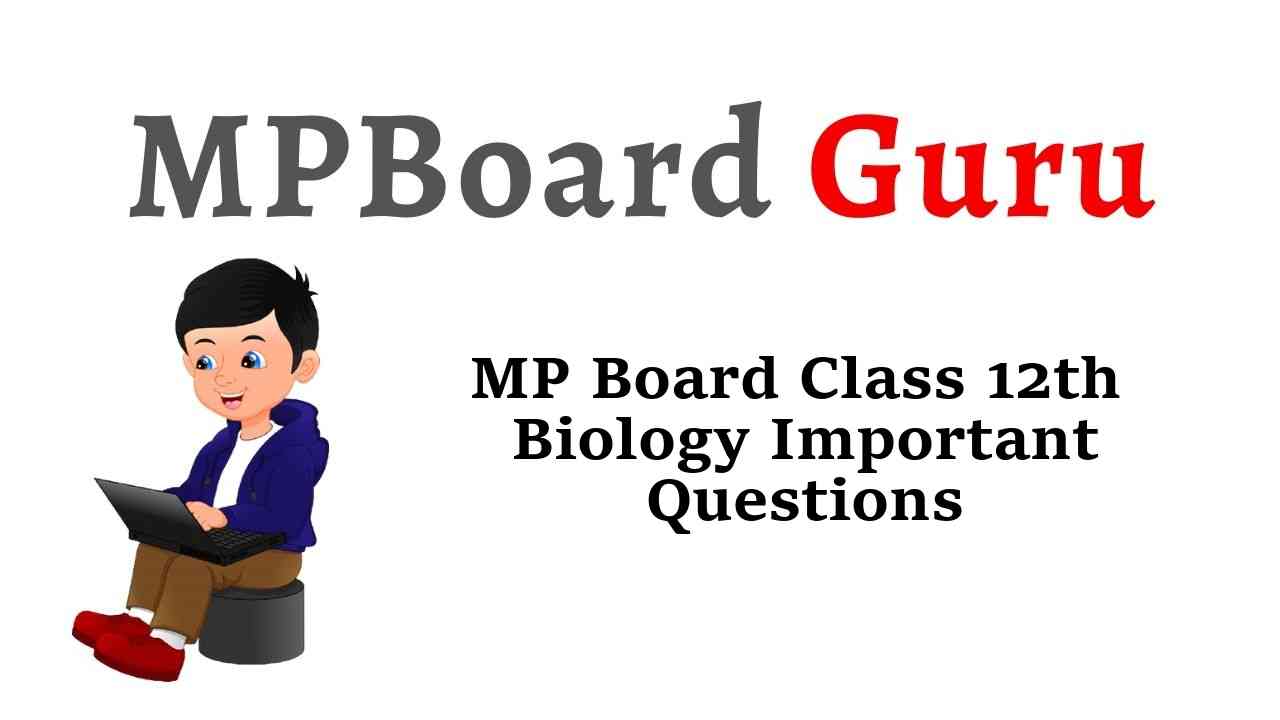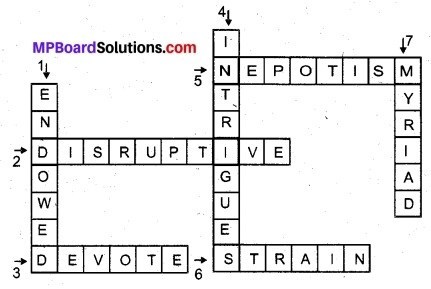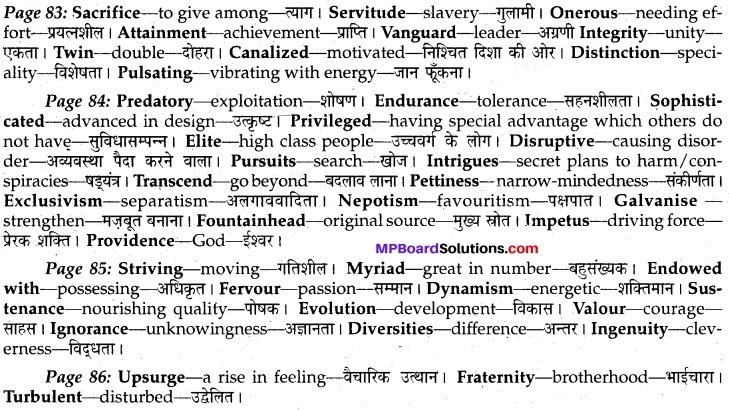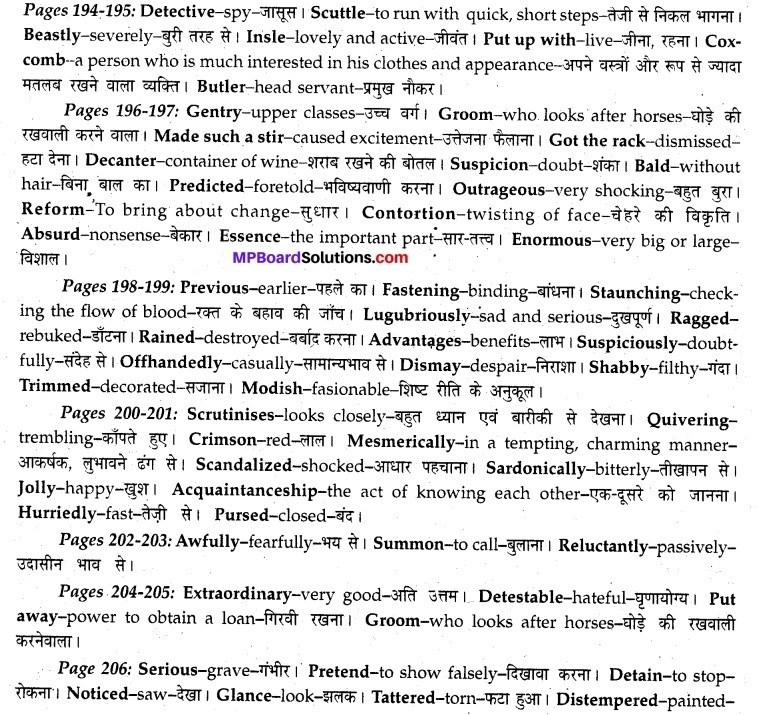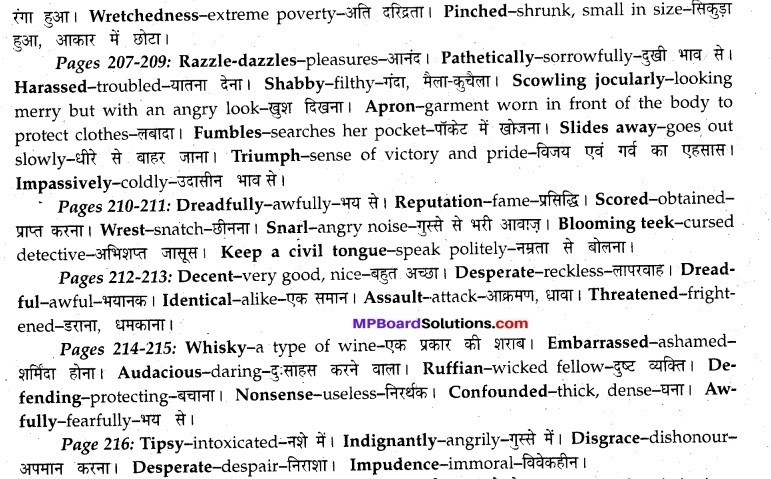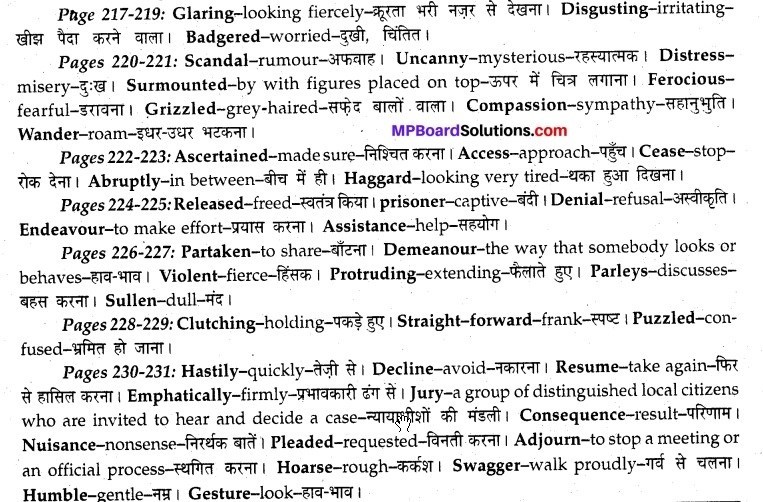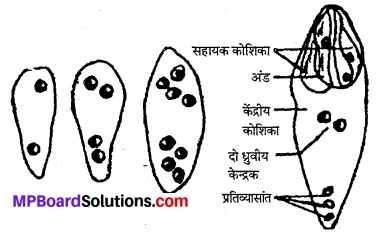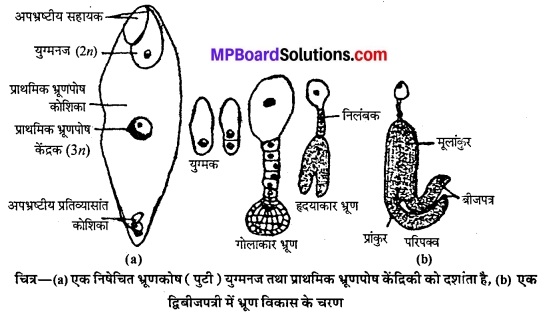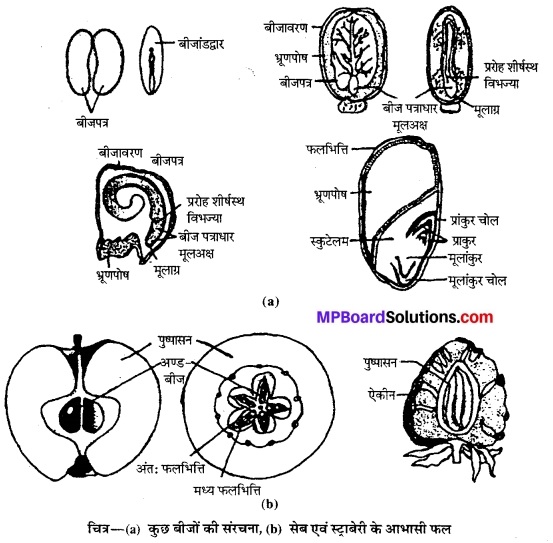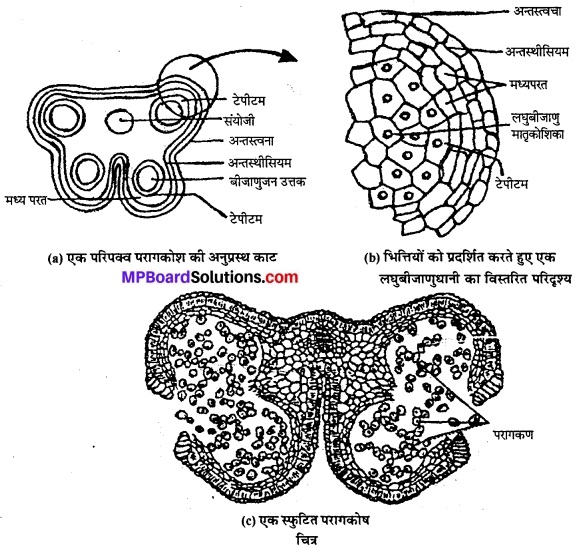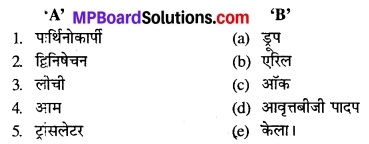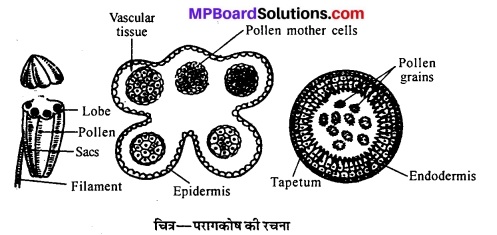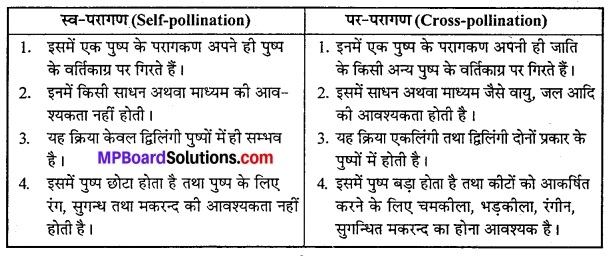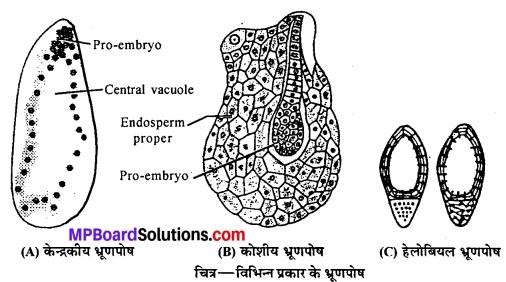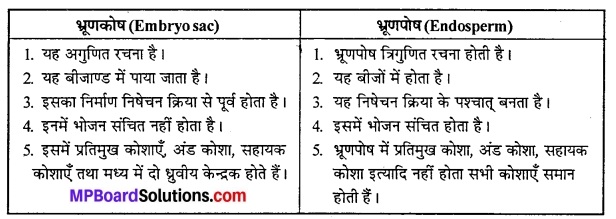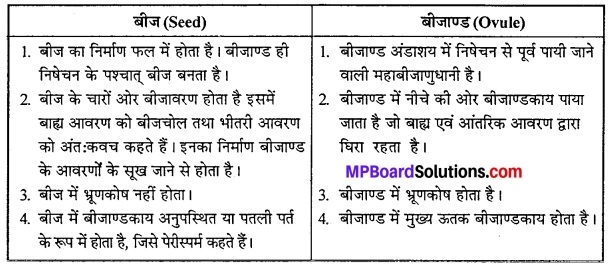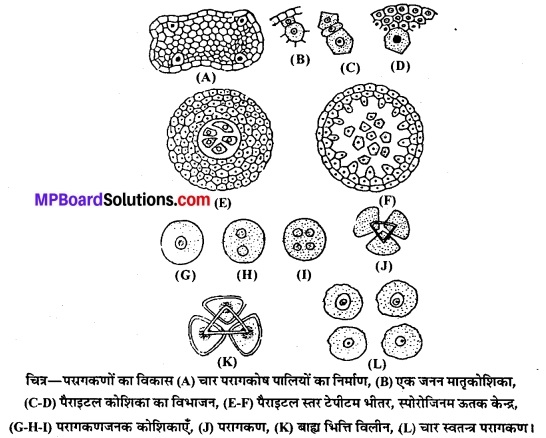MP Board Class 12th Hindi Makrand Solutions Chapter 7 बल-बहादुरी (निबन्ध, कन्हैयालाल मिश्र ‘प्रभाकर’)
बल-बहादुरी पाठ्य-पुस्तक पर आधारित प्रश्न
बल-बहादुरी लघु उत्तरीय प्रश्नोत्तर
Bal Bahaduri Class 12 MP Board प्रश्न 1.
बल और सहृदयता में क्या अंतर है?
उत्तर:
बल में पौरुष होने का भाव होता है, जबकि सहृदयता में देवत्व होने का भाव होता है।
Makrand Hindi Book Class 12 Solutions MP Board प्रश्न 2.
मानवता के विकास की पुण्य-भूमि किसे कहा गया है?
उत्तर:
अभय और शांति के सुंदर मिलन को मानवता के विकास की पुण्य-भूमि कहा गया है।
Hindi Makrand Class 12th MP Board प्रश्न 3.
बल का उपयोग विवेक के साथ क्यों करना चाहिए?
उत्तर:
बल का उपयोग विवेक के साथ करने से व्यक्ति स्वर्ग की सीमा तक पहुँच जाता है।
प्रश्न 4.
लेखक ने बल के किन दो रूपों का वर्णन किया है?
उत्तर:
लेखक ने बल के सदुपयोग और दुरुपयोग दो रूपों का प्रयोग किया है।
प्रश्न 5.
सम्राट अकबर ने किन वीरों का सम्मान किया था?
उत्तर:
सम्राट अकबर ने जयमल और फत्ता नामक वीरों का सम्मान किया था।
प्रश्न 6.
अंग्रेज सेनापति द्वारा झाँसी की रानी की वीरता की प्रशंसा को लेखक ने क्यों महत्त्वपूर्ण माना है?
उत्तर:
लेखक अंग्रेज सेनापति ह्यूरोज द्वारा झाँसी की रानी की वीरता की प्रशंसा को इसलिए महत्त्वपूर्ण माना है क्योंकि एक प्रतिद्वंद्वी वीर ने उसकी वीरता की प्रशंसा की थी।
बल-बहादुरी दीर्घ उत्तरीय प्रश्नोत्तर
प्रश्न 1.
‘सबल के बल का सदुपयोग ही सफलता की कुंजी है।’ इस कथन को कीजिए। (M.P. 2009, 2012)
उत्तर:
शक्तिशाली व्यक्ति यदि बल का सदुपयोग करे तो सफलता उसके कदम चूमती है। उसे जीवन के प्रत्येक क्षेत्र में विजय प्राप्त होती है। राम और कृष्ण इसके उदाहरण हैं। उन्होंने बल का सदुपयोग किया था इसीलिए उनकी जयंती मनाई जाती है। रावण और कंस दोनों ने बल का दुरुपयोग किया था। यही कारण है कि उनके स्मरण मात्र से मन में घृणा उत्पन्न होती है।
प्रश्न 2.
सात्त्विक सहयोग को राष्ट्रों के निर्माण की मूलशिला क्यों कहा गया है?
उत्तर:
सात्त्विक सहयोग को राष्ट्रों के निर्माण की मूलशिला कहा गया है क्योंकि उसमें बल और प्रेम का सहयोग होता है। सात्त्विक सहयोग में अभिमान एवं कर्मण्यता, त्याग और ईमानदारी आदि मानवीय गुण सम्मिलित होते हैं।
प्रश्न 3.
बल और बुद्धि में पारस्परिक संबंध है-उदाहरण सहित समझाइए।
उत्तर:
बल और बुद्धि में पारस्परिक संबंध है क्योंकि बुद्धि के बिना बल व्यर्थ है। बल के अभाव में बुद्धि अपंग के समान है। उदाहरणार्थ-राजदूतों में वल था लेकिन बुद्धि का अभाव था। वे युद्ध-भूमि में शत्रुओं से सिंह की भाँति लड़े। उनकी वीरता की शत्रु व मित्र सभी ने प्रशंसा की। इतनी वीरता दिखाने के बाद भी वे पराजित हुए। यदि उनमें बल के साथ बुद्धि होती, तो उनका इतिहास कुछ और ही होता।
प्रश्न 4.
लेखक के बल की चरम सीमा कहाँ तक बतलाई है?
उत्तर:
लेखक ने बल की चरम सीमा शत्रुओं के समूह-गर्जन में, केसरी के साथ खेलने में या फिर देश और धर्म के लिए हँसते-हँसते अपने प्राणों का बलिदान देने में बताई है।
प्रश्न 5.
बल की दृष्टि से पश्चिम और भारत में क्या अंतर है? (M.P. 2010)
उत्तर:
बल की दृष्टि से पश्चिम और भारत की दृष्टि में पर्याप्त अंतर है। पश्चिम शारीरिक बल का उपासक है और भारत आत्मबल अर्थात् बुद्धि के बल को महत्त्व देता है।
प्रश्न 6.
शरीर-बल और आत्म-बल में लेखक ने किसे श्रेष्ठ माना है? आज विश्व कल्याण के लिए दोनों में से कौन-सा अधिक उपयोगी है?
उत्तर:
लेखक ने शरीर-बल और आत्मवल में से आत्मबल को श्रेष्ठ माना है। आज विश्व कल्याण के लिए दोनों में से आत्मबल सर्वाधिक उपयोगी है।
बल-बहादुरी भाव-विस्तार/पल्लवन
प्रश्न 1.
“पुरुषत्व, अभय का जनक है और देवत्व शान्ति का।”
उत्तर:
पुरुषत्व अर्थात् वीरता और पराक्रम का भाव मनुष्य में निडरता का भाव उत्पन्न करता है। इस प्रकार पुरुपत्व निर्भयता का जनक है। इस प्रकार जब व्यक्ति में कल्याण चाहने वाले देवता होने का भाव उत्पन्न होता है, तो उसमें शांति उत्पन्न होती है। इस तरह देवत्व शांति का जनक है। जब अभय ओर शांति दोनों मिल जाते हैं, तो मानवता के विकास की पुण्य भूमि उत्पन्न हो जाती है। निर्भयता और शांति की स्थिति में ही मानवता का विकास होता है।
प्रश्न 2.
“बल अंधा है और उसकी गति पथ-प्रदर्शक के अधीन है।”
उत्तर:
निश्चय ही बल अंधा होता है। उसमें अच्छा-बुरा सोचने, उचित-अनुचित के संबंध में विचार करने की शक्ति नहीं होती। बल के वशीभूत होकर ही व्यक्ति उसका दुरुपयोग कर अन्याय और अत्याचार करता है। वल को सही दिशा देने का कार्य मार्ग दिखाने वाले का होता है। वह बल को सदुपयोग के मार्ग पर भी चला सकता है और दुरुपयोग के मार्ग पर भी। बल का सदुपयोग उसकी सफलता है और दुरुपयोग उसकी असफलता है।
बल-बहादुरी भाषा-अनुशीलन
प्रश्न 1.
नीचे कुछ शब्द दिए जा रहे हैं, उनमें से ‘प्रत्यय’ पृथक् कर लिखिए –
पुरुषत्व, मानवता, वीरता, कर्मण्यता, दूधवाला, चरितार्थता।
उत्तर:
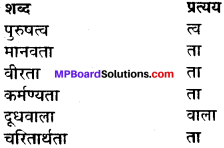
प्रश्न 2.
निम्नलिखित शब्दों का समास-विग्रह कर समास का नाम लिखिए –
इतिहास-उपवन, वीरता-वल्लरी, परागमाला।
उत्तर:

प्रश्न 3.
दिए गए वाक्यों को निर्देशानुसार रूपांतरित कीजिए –
- मोहन पुस्तक खरीदकर पढ़ता है। (मिथ वाक्य में)
- समय बहुत खराब है, इसलिए देखभाल कर चलना चाहिए। (सरल वाक्य में)
- विद्वानों का सभी आदर करते हैं। (मिश्र वाक्य में)
- तुम परिश्रम करो और परीक्षा में सफल हो जाओ। (सरल वाक्य में)
- राम पुस्तकें पढ़ता है जिससे उसे ज्ञान प्राप्त होता है। (संयुक्त वाक्य में)
उत्तर:
- मोहन ने कहा कि वह पुस्तक खरीदकर पढ़ता है।
या
जब मोहन पुस्तक खरीदता है, तब पढ़ता है। - देखभाल कर चलो समय बहुत खराब है।
- जो विद्वान हैं, उनका सभी आदर करते हैं।
- तुम परिश्रम करके परीक्षा में सफल हो सकते हो।
- राम पुस्तकें पढ़ता है और उसे ज्ञान प्राप्त होता हैं।
बल-बहादुरी योग्यता-विस्तार
प्रश्न 1.
वीर पुरुषों और वीरांगनाओं के चित्रों का संग्रह कर अलबम बनाइए।
उत्तर:
छात्र राम, कृष्ण, अर्जुन, महाराणा प्रताप, शिवाजी, रानी लक्ष्मीबाई आदि के चित्र एकत्र कर अलबम बना सकते हैं।
प्रश्न 2.
किसी बलिदानी वीर के बारे में 10 पंक्तियाँ लिखिए।
उत्तर:
रानी लक्ष्मीबाई, भगतसिंह आदि किसी पर भी छात्र स्वयं दस पंक्तियाँ लिखें।
प्रश्न 3.
किसी देश-भक्त का रेखाचित्र बनाइए।
उत्तर:
छात्र स्वयं करें।
प्रश्न 4.
‘बल और बुद्धि में कौन श्रेष्ठ है’ विषय पर अपने विचार लिखिए।
उत्तर:
छात्र स्वयं करें।
बल-बहादुरी परीक्षोपयोगी अन्य महत्वपूर्ण प्रश्न
I. वस्तुनिष्ठ प्रश्न –
प्रश्न 1.
‘बल-बहादुरी’ निबंध के लेखक हैं –
(क) कन्हैयालाल मिश्र ‘प्रभाकर’
(ख) कन्हैयालाल नंदन
(ग) भगीरथ मिश्र
(घ) यतीन्द्र मिश्र
उत्तर:
(क) कन्हैयालाल मिश्र ‘प्रभाकर’।
प्रश्न 2.
कौन-सी बहादुरी सात्विक और ग्रहणीय है –
(क) अपनी स्वार्थवृत्ति को पूरा करने वाली
(ख) जनकल्याण करने वाली
(ग) लोगों को भयभीत कर कायर बनाने वाली
(घ) निर्दोष जनता को सताने वाली
उत्तर:
(ख) जनकल्याण करने वाली।
प्रश्न 3.
अज्ञान का पुत्र बताया गया है –
(क) लोभ को
(ख) मोहमाया को
(ग) अहंकार को
(घ) क्रूरता को
उत्तर:
(ग) अहंकार को।
प्रश्न 4.
राष्ट्र एवं जातियों के गौरव की स्थिति किसके शिशुओं जैसी है?
(क) कोकिल के
(ख) मनुष्य के
(ग) जानवरों के
(घ) राक्षसों के
उत्तर:
(क) कोकिल के।
प्रश्न 5.
बल और बुद्धि का संबंध वही है जो –
(क) देह और आँख का
(ख) बुद्धि और बल का
(ग) त्याग और तपस्या का
(घ) स्वार्थ और भोग का
उत्तर:
(क) देह और आँख का।
प्रश्न 6.
औरंगजेब कम बल राशि का स्वामी होते हुए भी साम्राज्य का स्वामी किसके प्रभाव से बन सका –
(क) बुद्धि कौशल से
(ख) रण-कौशल से
(ग) इच्छा शक्ति से
(घ) भाग्य-कौशल से
उत्तर:
(क) बुद्धि कौशल से।
प्रश्न 7.
बल ………….. होता है।
(क) अंधा
(ख) कान का कच्चा
(ग) अभिमानी
(घ) स्वार्थी
उत्तर:
(क) अंधा।
प्रश्न 8.
पश्चिम …… उपासक है।
(क) शरीर बल का
(ख) आत्मबल का
(ग) सैन्य बल का
(घ) धन-बल का
उत्तर:
(क) शरीर बल का।
प्रश्न 9.
भारत ………. उपासक है।
(क) आत्मबल का
(ख) शरीर-बल का
(ग) धन-बल का
(घ) पशु-वल का
उत्तर:
(क) आत्मबल का।
प्रश्न 10.
इतिहास-रत्न जयमल और वीर शिरोमणि फत्ता का हम कितना ही गुणगान करें, पर उसका सच्चा सम्मान तो –
(क) झाँसी की वीरांगना महारानी लक्ष्मीबाई ही कर सकती थी।
(ख) मुगल सम्राट वीर अकबर ही कर सकता था।
(ग) मुगल सम्राट महान् शाहजहाँ ही कर सकता था।
(घ) उसके होठ जरा बाहर निकल जाते थे।
(ङ) औरंगजेब ही कर सकता था।
उत्तर:
(ख) मुगल सम्राट वीर अकबर ही कर सकता था।
II. निम्नलिखित रिक्त स्थानों की पूर्ति दिए गए विकल्पों के आधार पर करें –
- शाहजहाँ का उत्तराधिकारी अत्यन्त ………. था। (चतुर बलवान)
- कन्हैयालाल मिश्र ‘प्रभाकर’ के निबंध का नाम ………. है। (बल बहादुरी मेरे सपनों का भारत)
- भारत ………. का उपासक है। (आत्मवल शक्तिबल)
- प्रकृति ने गाँधी की ………. की। (महावृष्टि, महासृष्टि)
- वे जहाँ लड़े ………. की भाँति लड़े। (सिंह/शेर)
उत्तर:
- बलवान
- बल-बहादुरी
- आत्मबल
- महासृष्टि
- सिंह।
III. निम्नलिखित कथनों में सत्य असत्य छाँटिए –
- ‘बल-बहादुरी’ निबंध के लेखक यतीन्द्र मिश्र हैं। (M.P. 2009)
- शाहजहाँ का उत्तराधिकारी दारा था।
- बल में देवत्व का निवास है।
- बल की चरम सीमा नहीं है।
- गुरुनानक के आत्मज दीवार में चुने गए।
उत्तर:
- असत्य
- सत्य
- असत्य
- सत्य
- असत्य।
IV. निम्नलिखित के सही जोड़े मिलाइए –
प्रश्न 1.
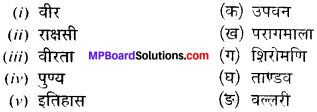
उत्तर:
(i) शिरोमणि
(ii) ताण्डव
(iii) वल्लरी
(iv) परागमाला
(v) उपवन
V. निम्नलिखित प्रश्नों के उत्तर एक शब्द या एक वाक्य में दीजिए –
- सौभाग्य-श्री का पुनीत वरदान क्या है?
- आकर्षण का केन्द्र क्या है?
- वीरता का सार किसमें है?
- गाँधी की महासृप्टि किसने की?
- स्वर्ग की सीमा में कौन ले जाता है?
उत्तर:
- बल के साथ बुद्धि का एकमात्र संयोग।
- बल।
- न्यौछावर करने में।
- प्रकृति ने।
- विवेक का साहचर्य।
बल-बहादुरी लघु उत्तरीय प्रश्न
प्रश्न 1.
कायरता का पिता और उसकी परी किसे बताया गया है?
उत्तर:
भय को कायरता का पिता और दीनता को उसकी सहचरी बताया गया है।
प्रश्न 2.
पैशाचिकता की सखी कौन है?
उत्तर:
पैशाचिकता की सखी क्रूरता है।
प्रश्न 3.
राम और कृष्ण की जयंती मनाने का कारण क्या बताया गया है?
उत्तर:
राम और कृष्ण की जयंती मनाने का कारण उनके द्वारा बल का सदुपयोग करना बताया गया है।
प्रश्न 4.
शाहजहाँ का उत्तराधिकारी दारा, कितने हाथियों की बलराशि का स्वामी था?
उत्तर:
शाहजहाँ का उत्तराधिकारी दारा, साठ हजार हाथियों से भी अधिक बलराशि का स्वामी था।
प्रश्न 5.
कवि की कविता की सच्ची प्रशंसा करने का अधिकारी किसे बताया गया है?
उत्तर:
एक कवि की कविता की सच्ची प्रशंसा का अधिकारी दूसरे कवि को बताया गया है।
प्रश्न 6.
बल के अभाव में क्या दिखाई देता है?
उत्तर:
बल के अभाव में कायरता का दयनीय दर्शन दिखाई देता है।
प्रश्न 7.
क्रूरता क्या करती है?
उत्तर:
क्रूरता अज्ञान के पुत्र अहंकार का पोषण करती है।
प्रश्न 8.
बल और बुद्धि का संबंध किस तरह का है?
उत्तर:
बल और बुद्धि का संबंध देह और आँख की तरह है।
बल-बहादुरी दीर्घ उत्तरीय प्रश्न
प्रश्न 1.
किनका पारस्परिक विरोध विश्व के विशाल राष्ट्रों और जातियों को हृदयबेधी इतिहास में बदल देता है?
उत्तर:
बल और प्रेम का पारस्परिक विरोध विश्व के विशाल राष्ट्रों और जातियों को हृदयबेधी इतिहास में बदल देता है। इनमें परस्पर विरोध के कारण विशाल राष्ट्रों और जातियों को नष्ट-भ्रष्ट कर देता है।
प्रश्न 2.
बल का क्या महत्त्व है?
उत्तर:
बल का बड़ा महत्त्व है। जो मनुष्य शक्तिशाली होता है, उसका व्यक्तित्व सबको अपनी ओर आकर्षित करता है। उसको सभी प्रेम और श्रद्धा के साथ प्रेम का उपहार देते हैं और स्वयं को सौभाग्यशाली समझते हैं। शक्तिशाली व्यक्ति सभी में लोकप्रिय हो जाता है।
प्रश्न 3.
किस वरदान को पुनीत कहा गया है और क्यों?
उत्तर:
बल और बुद्धि के संयोग को सौभाग्य श्री का वरदान कहा गया है; क्योंकि जिस मनुष्य जाति और राष्ट्र के लोगों को यह वरदान प्राप्त हो जाता है, सफलता उनके सामने हाथ वाँधे खड़ी होने में ही अपनी सार्थकता समझती है। वल-बुद्धि के संयोग से ही प्रत्येक क्षेत्र में सफलता प्राप्त होती है।
प्रश्न 4.
एक की जयंती मनाई जाती है और दूसरे की नहीं। क्यों?
उत्तर:
एक की जयंती मनाई जाती है और दूसरे की नहीं। ऐसा इसलिए कि एक ने अपनी शक्ति का उपयोग जनता के अधिकारों की रक्षा के लिए किया था। उसने अन्यायी, अत्याचारी और दुराचारी प्रवृत्ति के लोगों में फंसी जनता को मुक्ति बीमार का इलाज दिलाने के लिए उनका संहार किया था। दूसरे ने जनता के अधिकारों का बलपूर्वक हनन किया था। उसके अधिकारों को छीना और उसे खूब सताया था।
प्रश्न 5.
बल की क्या विशेषताएँ हैं?
उत्तर:
बल में आकर्षण होता है। इसलिए वह अपनों को ही नहीं, अपितु दूसरों को भी अपनी ओर आकर्षित कर लेता है। फलस्वरूप उसे सभी ललचाई हुई दृष्टि से देखते हैं। उसके प्रति प्रेम और श्रद्धा के उपहार समर्पित करते हैं। फिर उसे प्रशंसा के एक-एक वाक्य सुनाने लगते हैं।
बल-बहादुरी लेखक-परिचय
प्रश्न 1.
कन्हैयालाल मिश्र ‘प्रभाकर’ का संक्षिप्त जीवन-परिचय देते हुए उनकी साहित्यिक विशेषताओं का उल्लेख कीजिए।
उत्तर:
जीवन-परिचय:
कन्हैयालाल मिश्र ‘प्रभाकर’ का जन्म सन् 1906 में उत्तर प्रदेश के सहारनपुर ज़िले में देवबंद नामक स्थान में हुआ। उनकी प्रारंभिक शिक्षा स्थानीय स्कूलों में हुई। उनकी रुचि प्रारंभ से ही राजनीतिक एवं सामाजिक कार्यों में थी। उच्च शिक्षा ग्रहण करते समय ही वे स्वतंत्रता आंदोलन में कूद पड़े। फलस्वरूप उनकी शिक्षा पूर्ण न हो सकी। ‘प्रभाकर’ जी समय-समय पर राष्ट्रीय स्वतंत्रता आंदोलनों में सक्रिय भाग लेने के कारण कई बार जेल गए। छोटी आयु से ही वे अखबारों में लिखने लगे। उन्होंने कलकत्ता (अब कोलकाता) से प्रकाशित होने वाले ‘ज्ञानोदय’ नामक पत्र का अनेक वर्षों तक सफल संपादन किया।
सहारनपुर में अपना छापाखाना (प्रेस) स्थापित किया और ‘नया जीवन’ नामक पत्रिका का प्रकाशन किया। संरमरण और रेखाचित्र के क्षेत्र में यह पत्रिका बेजोड़ थी। इसके कारण इन्हें विशेष ख्याति मिली। सन् 1990 में हिन्दी सेवाओं के लिए उन्हें ‘पद्मश्री’ की उपाधि से अलंकृत किया गया। ‘प्रभाकर’ जी.की रचनाओं में गाँधीवादी विचारधारा का स्पष्ट प्रभाव है। उनकी प्रत्येक रचना में समाज एवं परिवार को सुखी बनाने का उद्देश्य दिखाई पड़ता है। उनकी रचनाओं में राष्ट्रीय भावना का भी समावेश है। सन् 1995 में उनका स्वर्गवास हो गया।
साहित्यिक विशेषताएँ:
‘प्रभाकर’ जी ने अपनी साहित्यिक यात्रा का प्रारंभ एक पत्रकार के रूप में किया। उन्होंने लघु कहानियाँ. संस्मरण, रेखाचित्र तथा निबन्धों की रचना की। वे हिन्दी के रेखाचित्र, संस्मरण एवं ललित निबंधों के श्रेष्ट रचनाकारों में गिने जाते हैं।
रचनाएँ:
नई पीढ़ी नए विचार, जिंदगी मुस्कराई, माटी हो गई सोना, आकाश के तारे, धरती के फूल, दीप जले : शंख बजे, बाजे पायलिया के घुघरू, क्षण बोले : कण मुसकाए, महके आँगन चहके द्वार, जिएँ तो ऐसे जिएँ आदि।
भाषा-शैली:
‘प्रभाकर’ जी की भाषा-शैली सजीव, प्रवाहपूर्ण, आत्मीय एवं मर्मस्पर्शी है। वे छोटी-से-छोटी एवं वड़ी-से-बड़ी बात को सहजता से कह जाने में सिद्धहस्त थे। उनकी समस्त रचनाओं में नवीनता एवं ताजगी है, जो पाठकों को अपनी ओर आकर्षित कर लेती है। उनकी भाषा-शैली में उदाहरणों व सूक्तियों का पर्याप्त मात्रा में समावेश है। वे अपनी बात की पुष्टि में उदाहरण का प्रयोग करते हैं। उनकी भाषा विषयानुकूल है।
बल-बहादुरी पाठ का सारांश
प्रश्न 2.
‘बल-बहादुरी’ निबंध का सार अपने शब्दों में लिखिए।
उत्तर:
‘बल-बहादुरी’ कन्हैयालाल मिश्र ‘प्रभाकर’ द्वारा रचित एक विवेचनात्मक निबंध है। इसमें लेखक ने बल के सदुपयोग करने पर बल दिया है। लेखक बल और सहदय में अंतर स्पष्ट करते हुए कहता है कि बल में पौरुष होता है और सहृदयता में देवत्व। बल का अभाव कायरता है और सहृदयता का अभाव पाप और दानवता है। कायरता भय का पिता और हीनता उसकी सहचरी है।
पौरुष से निडरता आती है और सहदयता से शांति। जब निडरता और का समन्वय होता है तो मानवता का विकास होता है। रावण, कंस, राम और कृष्ण सभी बलशाली थे। परंतु दो की ही जयंती मनाई जाती है और दो की नहीं। ग़म और कृष्ण ने अपने बल का सदुपयोग जनता के हित के लिए किए। जबकि रावण और कंस ने अपने स्वार्थों की पूर्ति के लिए बल का दुरुपयोग किया। सबल के बल का सदुपयोग करना उसकी सफलता की कुंजी है। यद्यपि वल एक होता है किंतु सदुपयोग ओर दुरुपयोग के आधार पर दो रूपों में दिखाई देता है।
वल और विवेक का साहचर्य मनुष्य को स्वर्ग में ले जाता है, तो अविवेक का नरक में ले जाता है। सामान्य रूप से बल अंधा होता है और उसकी गति पथ-प्रदर्शक के अधीन होती है। बल और प्रेम का सात्विक सहयोग राष्ट्रों के निर्माण का आधार है, तो विरोध उनके विनाश का इतिहास। बल आकर्षण का केंद्र होता है। वह सभी को अपनी ओर खींचता है। वीर अपने विरोधी वीर के एक प्रशंसाभरे वाक्य को अधिक महत्त्व देता है। वास्तव में एक वीर ही दूसरे वीर का सच्चा सम्मान कर सकता है। झाँसी की रानी का वास्तविक सम्मान ब्रिटिश सेना के वीर सेनापति ह्यूरोज के शब्दों में ही मिलता है।
बल और बुद्धि का वही संबंध है जो शरीर और आँख का है। बुद्धि कौशल के अभाव में बल निरर्थक है और बल के बिना बुद्धि व्यर्थ है। इसी कारण तो राजपूतों को हार का मुंह देखना पड़ा। दाराशिकोह शक्तिशाली था परन्तु औरंगजेब बुद्धिमान। वह अपने बुद्धि-कौशल से ही शाहजहाँ के साम्राज्य का सम्राट बन बैठा। – जिस मनुष्य, जाति या राष्ट्र में बल और बुद्धि एकत्र हो जाते हैं वहाँ सफलता और विजय निश्चित होती है। बल-बुद्धि का संयोग सुख पर आधारित होने पर सौंदर्य एवं प्रेम के सम्मिलन की भाँति सुंदर, प्रकृति एवं पुरुष के सम्मिलन की तरह पवित्र और काव्य एवं संगीत के सम्मिलन के समान अजेय हो जाता है।
बल की चरम-सीमा वीर की अविचल मुस्कान में है, जो संकटों की स्थिति में भी उसके मुख पर बनी रहती है। विश्व का इतिहास ऐसे वीरों से भरा पड़ा है, जो धर्म देश और मानव के हित में अपने प्राणों को न्यौछावर करने से पीछे नहीं हटे। पाश्चात्य देशों और भारत में यही अंतर है कि पाश्चात्य देश बल को महत्त्व देते हैं और भारत आत्मबल को। महात्मा बुद्ध और महात्मा गाँधी ने संसार में आत्मबल की महासृष्टि की और भारतीय संस्कृति के इतिहास में अहिंसा को प्रतिष्ठित कर एक नया अध्याय जोड़ा। अतः जनकल्याण करने वाली बहादुरी सात्विक और ग्रहणीयहै।
बल-बहादुरी संदर्भ-प्रसंगसहित व्याख्या
प्रश्न 1.
बल में पुरुषत्व का निवास है और सहृदयतो में देवत्व का। बल के अभाव में परिलक्षित होता है क्लीबत्व का दयनीय दर्शन और सहृदयता की शून्यता में तांडव करती है, पापपुंज-प्रोज्ज्वलित पैशाचिकता! क्लीबत्व भय का पिता है और उसकी सहचरी है दीनता, पर पैशाचिकता की सखी है क्रूरता और वह अज्ञान के पुत्र अहंकार का पोषण करती है। पुरुषत्व अभय का जनक है और देवत्व शांति का। अभय और शांति का यह सुंदर सम्मेलन ही मानवता के विकास की पुण्य-भूमि है। (Page 26)
शब्दार्थ:
- पुरुषत्व – पौरुष, वीरता।
- क्लीबत्व – नपुंसकता, कायरता, अपुरुषत्व।
- सहृदयता – दयालुता, करुणा, चित की कोमलता।
- देवत्व – परमात्मा होने का भाव।
- परिलक्षित – अच्छी तरह दिखाई देना।
- सहचरी – साथिन, साथी।
- पैशाचिकता – राक्षस जैसा व्यवहार।
- सखी – सहेली।
- क्रूरता – निर्दयता, कठोरता।
- अहंकार – अभिमान।
- पोषण – पालना, बड़ा करना।
- अभय – निडर, निर्भय।
प्रसंग:
प्रस्तुत गद्यांश कन्हैयाताल मित्र ‘प्रभाकर’ द्वारा रचित निबंध ‘वल-बहादुरी’ से लिया गया है। इसमें लेखक ने बल और सहृदयता के अंतर को स्पष्ट करने के लिए साथ-साथ निडरता और शांति के समन्वय को मानवता के विकास की आधारभूमि बताया है।
व्याख्या:
लेखक बल और सहृदयता का अंतर स्पष्ट करते हुए कह रहा है कि बल अर्थात् शक्ति, पराक्रम में वीरता का निवास होता है, जबकि मन की कोमलता अथवा दयालुता में देवता होने का भाव रहता है। शक्ति अथवा पौरुष के अभाव में अच्छी तरह से कायरता, नपुंसकता के दयनीय दर्शन होते हैं। दूसरे शब्दों में वीरता के अभाव में मनुष्य में कायरता आ जाती है। कायरता के कारण ही उसका व्यवहार दयनीय हो जाता है। शक्ति और दयालुता की कमी के कारण ही पुरुष का उग्र रूप दिखाई देता है। इससे वह निर्दयतापूर्वक अपनी शक्ति का दुरुपयोग करता है। इससे उसमें राक्षसी प्रवृत्ति उत्पन्न हो जाती है।
कायरता या नपुंसकता भय से पैदा होती है। इसीलिए कायरता भय (डर) का पिता है और हीनता उसकी साथिन हैं। दूसरे शब्दों में कायरता से मनुष्य के मन में भय उत्पन्न होता है और भय से हीनता आती है। राक्षसी व्यवहार की सहेली निर्दयता है और वह अज्ञान के पुत्र अभिमान को पालती है। दूसरे शब्दों में मनुष्य में अज्ञानता के कारण अभिमान और घमंड आता है और उसी के वशीभूत होकर वह राक्षसों जैसा व्यवहार करता है।
वीरता का भाव निर्भयता को जन्म देता है और दयालुता या श्रद्धा का भाव शांति की भावना उत्पन्न करता है। जब निडरता और शांति मिल जाते हैं, तो यह सुंदर सम्मिलन ही मानवता के विकास की पवित्र भूमि है। दूसरे शब्दों में निडरता और शांति जब मिल जाते. हैं, तो मानवता के विकास की पुण्य भूमि तैयार हो जाती है।
विशेष:
- बल और सहृदयता का अंतर स्पष्ट किया गया है। कायरता और भय तथा अज्ञान और अहंकार का संबंध भी स्पष्ट किया गया है।
- भाषा कठिन है। समास शैली का प्रयोग किया गया है।
- लेखक ने गागर में सागर भरने का प्रयास किया है।
- भाषा सूक्ति समान वाक्यों से बोझिल है।
गद्यांश पर आधारित अर्थग्रहण संबंधित प्रश्नोत्तर
प्रश्न (i)
बल और सहृदयता का अंतर स्पष्ट कीजिए।
उत्तर:
बल और सहृदयता में यह अंतर है कि बल अर्थात् शक्ति और पराक्रम में वीरता का निवास होता जबकि सहृदयता में देवत्व का निवास होता है।
प्रश्न (ii)
मानवता का विकास कैसे होता है?
उत्तर:
मनुष्य में पौरुष से निडरता उत्पन्न होती है। सहृदयता की कोमलता और दयालुता की भावना आती है। उस समय उसमें शांति उत्पन्न होती है। जब मनुष्य में अभय और शान्ति का सुन्दर और संतुलित सम्मिश्रण हो जाता है तो उसमें मानवता का विकास होता है।
प्रश्न (iii)
मनुष्य में कायरता कैसे उत्पन्न होती है?
उत्तर:
मनुष्य में कायरता भय से उत्पन्न होती है और भय से हीनता की भावना उत्पन्न होती है। इस प्रकार भय और हीनता से कायरता आती है।
गद्यांश पर आधारित विषय-वस्तु संबंधित प्रश्नोत्तर
प्रश्न (i)
मनुष्य राक्षसी व्यवहार क्यों करता है?
उत्तर:
मनुष्य में अज्ञानता के कारण अहंकार उत्पन्न होता है और अहंकार के वशीभूत होकर ही मनुष्य राक्षसी व्यवहार करता है।
प्रश्न (ii)
सहृदयता का अभाव मनुष्य को कैसे प्रभावित करता है?
उत्तर:
सहदयता के अभाव में पुरुष उग्र रूप धारण कर लेता है। वह निर्दयतापूर्वक वल का दुरुपयोग करता है। उसमें राक्षसी प्रवृत्ति उत्पन्न हो जाती है। मनुष्य इससे प्रभावित होकर अन्याय व अत्याचार जैसे पाप कर्म करने लगता है।
प्रश्न (iii)
राक्षसी व्यवहार की सखी और अज्ञान का पुत्र किसे कहा गया है?
उत्तर:
राक्षसी व्यवहार की सखी क्रूरता को ओर अज्ञान का पुत्र अहंकार को कहा गया है।
प्रश्न 2.
रावण भी बली था और राम भी, कृष्ण में भी बल का अधिष्ठान था और कंस में भी, पर एक की आज जयंती मनाई जाती है और दूसरे का स्मरण हमारे हृदयों में घृणा के उद्रेक का कारण होता है। बात क्या है? एक ने अपने बल का उपयोग किया जनता के अधिकारों की रक्षा में और दूसरे ने उनके अपहरण में, एक के बल का पथ-प्रदर्शक था प्रेम और दूसरे का स्वार्थ, बस दोनों का यही अंतर है। इसका अर्थ यह हुआ कि सबल के बल का सदुप्रयोग की उसकी सफलता की एकमात्र कुंजी है। (Page 26) (M.P. 2010)
शब्दार्थ:
- बली – बलवान, शक्तिशाली।
- अधिष्ठान – संस्था, वासस्थान।
- जयंती – जन्मदिन।
- स्मरण – यादगार।
- उद्रेक – वृद्धि, अधिकता।
- पथ-प्रदर्शक – मार्ग दिखाने वाला।
- अपहरण – छीन लेना, स्वार्थसिद्ध के लिए किसी को बलपूर्वक उठा ले जाना।
- सबल – सशक्त, बलवान।
प्रसंग:
प्रस्तुत गद्यांश कन्हैयालाल मिश्र ‘प्रभाकर’ द्वारा रचित निबंध ‘वल-बहादुरी’ से लिया गया है। इस गद्यांश में लेखक ने वल के सेदुपयोग और दुरुपयोग में अंतर स्पष्ट किया है।
व्याख्या:
लेखक कहता है कि रावण भी शक्तिशाली था और राम भी शक्तिशाली थे। इसी प्रकार भगवान श्रीकृष्ण भी शक्ति के पुंज थे और कंस भी बलशाली था। जब ये चारों बलशाली और शक्तिशाली थे तो भी इनमें से एक का जन्मदिन बड़ी – धूमधाम से मनाया जाता है जबकि दूसरे की याद आते ही हमारे हृदयों में घृणा की वृद्धि होती है। इसका कारण है एक ने अपनी शक्ति का उपयोग जनता के अधिकारों की रक्षा के लिए किया था।
उसने अन्याय, अत्याचारी, दुराचारी, राक्षस प्रवृत्ति के लोगों के चंगुल में फँसी जनता को मुक्ति दिलाने के लिए उनका संहार किया। दूसरे ने जनता के अधिकारों का बलपूर्वक हनन किया। उनके अधिकारों को छीना और जनता को सताया। एक ने शक्ति का मार्ग दिखाने का कार्य प्रेम से किया। उसने प्रेम के द्वारा जनता को अपना बनाया जबकि दूसरे ने अपनी ताकत का प्रयोग अपने स्वार्थों की पूर्ति के लिए किया। दोनों में अपनी शक्ति के प्रयोग में यही अंतर था।
एक ने दूसरों के हित के लिए प्रेम का मार्ग अपनाकर शक्ति का सदुपयोग किया, तो दूसरे ने अपने स्वार्थों की पूर्ति के लिए अपनी शक्ति का दुरुपयोग किया। इसका आशय यह हुआ कि शक्तिशाली की ताकत का सदुपयोग ही उसकी सफलता का आधार है। अपनी शक्ति का सदुपयोग करने वालों का जन्मदिन मनाया जाता है और दुरुपयोग करने वालों के स्मरण मात्र से घृणा उत्पन्न होती है। अतः शक्ति के सदुपयोग में ही जीवन की सफलता है।
विशेष:
- लेखक ने शक्ति (बल) के सदुपयोग और दुरुपयोग का अंतर उदाहरण देकर किया है।
- भापा तत्सम शब्दावली प्रधान है और शैली सामासिक है।
- प्रत्येक वाक्य नपा-तुला सूक्ति समान है।
गद्यांश पर आधारित अर्थग्रहण संबंधित प्रश्नोत्तर
प्रश्न (i)
राम और कृष्ण की जयंती मनाई जाती है, क्यों?
उत्तर:
राम और कृष्ण दोनों ही शक्तिशाली थे। इन दोनों बलशालियों के जन्मदिन बड़ी धूमधाम से मनाए जाते हैं; क्योंकि इन्होंने अपने बल का सदुपयोग जनता के अधिकारों की रक्षा के लिए किया था। उन्होंने अन्यायी, अत्याचारी और दुराचारी राक्षसी प्रवृत्ति के लोगों से मुक्ति दिलाने के लिए उनका संहार किया था।
प्रश्न (ii)
रावण और कंस के स्मरण मात्र से हमारे हृदयों में घृणा क्यों उत्पन्न होती है?
उत्तर:
रावण और कंस शक्तिशाली थे, किन्तु उन्होंने अपनी शक्ति का दुरुपयोग जनता के अधिकारों का हनन करने में, जनता को सताने के लिए, अन्याय, अत्याचार और अपहरण आदि जघन्य कार्यों में किया। अतः उनके स्मरण मात्र से हमारे हृदय में घृणा उत्पन्न हो जाती है।
प्रश्न 3.
राम और कृष्ण के बल की पथ-प्रदर्शक कौन था?
उत्तर:
राम और कृष्ण के बल का पथ-प्रदर्शक प्रेम था। इसी प्रेम के कारण वे अपने बल का सदुपयोग करने में सफल रहे।
गद्यांश पर आधारित विषय-वस्तु संबंधित प्रश्नोत्तर
प्रश्न (i)
राम और कृष्ण तथा रावण और कंस के शक्ति प्रयोग में क्या अन्तरथा?
उत्तर:
राम और कृष्ण ने अपनी शक्ति का सदुपयोग प्रेम के द्वारा जनता को अपना बनाने के लिए किया, जबकि रावण और कंस ने अपनी ताकत का दुरुपयोग अपने स्वार्थों की पूर्ति के लिए किया। दोनों के अपनी शक्ति के प्रयोग का यही अंतर था।
प्रश्न (ii)
राम व कृष्ण और रावण-कंस के पथ व प्रदर्शक कौन थे?
उत्तर:
राम व कृष्ण का पथ प्रदर्शक प्रेम था। उन्होंने परहित के लिए प्रेम का मार्ग अपनाकर शक्ति का सदुपयोग किया। रावण व कंस का पथ-प्रदर्शक स्वार्थ था। उन दोनों ने अपने स्वार्थों की पूर्ति के लिए अपनी शक्ति का दुरुपयोग किया।
प्रश्न 3.
राष्ट्र एवं जातियों के गौरव की स्थिति पूर्णतः कोकिल के शिशुओं जैसी है। उसका जन्म होता है, शक्ति की कल्याणमयी गोद में पर वह पलता है प्रेम के पवित्रपालने में। बल उसकी नसों में अभिमान एवं कर्मण्यता के रक्त का संचार करता है और प्रेम उसे त्याग का अमृत पिलाकर अमर करने का प्रयत्न । बल एवं प्रेम का यह सात्त्विक सहयोग ही राष्ट्रों के निर्माण की मूल शिला और इन दोनों का पारस्परिक विरोध ही विश्व के विशाल राष्ट्रों एवं जातियों के खंडहरों का सच्चा एवं हृदयबेधी इतिहास है। (Page 27)
शब्दार्थ:
- गौरव – गर्व, महत्त्व, प्रतिष्ठा, बड़प्पन।
- कोकिल – कोयल। कल्याणमयीसौभाग्यशाली, मंगलकारी।
- पवित्र – शुद्ध, निर्मल, निश्छल।
- पालना – भरण-पोषण करना, भोजन-वस्त्र आदि देकर बड़ा करना।
- अभिमान – घमंड, गर्व।
- नसों – रुधिर वाहिनी नलिकाएँ।
- कर्मण्यता – कर्तव्यपरायणता, संचार-गमन, मार्गदर्शन, संदेशवाहक साधन का प्रकार।
- अमृत – सुधा, वह वस्तु जिसके पीने से मुर्दा जी उठे।
- अमर – अविनाशी, न मरने वाला।
- सात्त्विक – सत्वगुणयुक्त, ईमानदार, नेक, शक्तिशाली।
- हृदयबेधी – हृदय को बेधने वाला, हृदय को छलनी करने वाला।
प्रसंग:
प्रस्तुत गद्यांश कन्हैयालाल मिश्र ‘प्रभाकर’ द्वारा रचित निबंध ‘बल-बहादुरी’ से लिया गया है। इस गद्यांश में लेखक ने राष्ट्र एवं जातियों के उत्थान तथा पतन को रेखांकित किया है।
व्याख्या:
लेखक कहता है कि राष्ट्र (देश) और जातियों की प्रतिष्ठा की स्थिति संपूर्ण रूप से कोयल के शिशुओं (बच्चों) की भाँति होती है। राष्ट्र और जातियों का उदय होता है और वे शक्ति की मंगलकारी गोद में प्रेम के निश्छल पालने में उनका भरण-पोषण होता है। यही कारण है कि उसकी खून वाहिनी नलिकाओं में गर्व एवं कर्तव्य पालने का भाव भरा होता है। अर्थात् देश और जातियों के लोगों में अपने देश व जातियों के प्रति गर्व और कर्तव्य की भावना भरी होती है।
वह निश्छल प्रेम उसे अपने देश व जाति के लिए सर्वस्व बलिदान करने का अमृत पिलाकर अमर वना देता है। शक्ति (ताकत) और स्नेह का यह सत्वगुणयुक्त सहयोग ही राष्ट्र के उत्थान की आधारशिला है और यदि बल और प्रेम में परस्पर विरोध हो तो संसार के विशाल (बड़े) राष्ट्रों एवं जातियों का पतन हो जाता है। विश्व में विभिन्न राष्ट्रों एवं जातियों के अवशेष इसी सच्चाई एवं हृदय को बेधने वाला इतिहास इसका साक्षी है।
विशेष:
- राष्ट्रों एवं जातियों के उत्थान व पतन के कारणों को स्पष्ट किया गया है। प्रेम एवं बल का सहयोग राष्ट्रों का उत्थान करता है, तो इनका विरोध उनका पतन।
- भाषा तत्सम प्रधान एवं दुरूह है किन्तु सुगठित है।
- समासयुक्त शैली है।
- प्रत्येक वाक्य सूक्ति लगता है।
गद्यांश पर आधारित अर्थग्रहण संबंधित प्रश्नोत्तर
प्रश्न (i)
राष्ट्र एवं जातियों के गौरव की स्थिति कैसी होती है?
उत्तर:
राष्ट्र एवं जातियों के गौरव की स्थिति कोकिल के बच्चों जैसी होती है। राष्ट्र और जातियों का जन्म होता है किन्तु उनका पालन-पोषण शक्ति और प्रेम के द्वारा होता है। इससे ही उन्हें गौरव प्राप्त होता है।
प्रश्न (ii)
राष्ट्रों एवं जातियों का उत्थान-पतन कैसे होता है?
उत्तर:
प्रेम और बल का सहयोग राष्ट्रों का उत्थान करता है तो इनका विरोध उनका पतन करता है।
प्रश्न (iii)
विश्व के विशाल राष्ट्रों एवं जातियों का हृदयवेधी इतिहास कैसे बनताहै?
उत्तर:
प्रेम और बल का पारस्परिक विरोध ही विश्व के विशाल राष्ट्रों एवं जातियों का हृदयवेधी इतिहास बनता है। उन दोनों के पारस्परिक विरोध और संघर्ष से राष्ट्र और जातियाँ नष्ट हो जाती हैं और इतिहास का भाग बन जाती हैं।
गद्यांश पर आधारित विषय-वस्तु संबंधित प्रश्नोत्तर
प्रश्न (i)
राष्ट्रों के निर्माण की आधारशिला क्या है?
उत्तर:
बल और प्रेम का सात्त्विक सहयोग राष्ट्रों के निर्माण की आधारशिला है।
प्रश्न (ii)
राष्ट्रों एवं जातियों के रक्त में बल और त्याग किसका संचार करते हैं?
उत्तर:
राष्ट्रों एवं जातियों के रक्त में बल अभियान एवं कर्मण्यता का संचार करता है। प्रेम उसमें त्याग की भावना उत्पन्न कर अमर बनाने का प्रयास करता है।
प्रश्न 4.
बल आकर्षण का केंद्र है। बल का उपयुक्त प्रदर्शन अपनों और बिगानों, सभी को अपनी ओर आकर्षित करता है। सबल को सभी मुग्ध दृष्टि से देखते हैं, प्रेम और श्रद्धा का स्नेहोपहार उसके चरणों में समर्पित कर सभी अपने को धन्य समझते हैं, पर वीर अपने प्रतिद्वंद्वी वीर के एक प्रशंसा-वाक्य को जनसाधारण के अतिशयोक्तिपूर्ण अपने भाषणों से अधिक महत्त्व देता है। वास्तव में एक कवि ही दूसरे कवि की सच्ची प्रशंसा करने का अधिकारी है और एक वीर ही दूसरे वीर का सच्चा सम्मान कर सकता है।
इतिहास-रत्न जयमल और वीर शिरोमणि फत्ता का हम कितना ही गुण-गान करें। पर उनका सच्चा सम्मान तो मुगल सम्राट वीर अकबर ही कर सकता था। झाँसी की वीर महारानी लक्ष्मीबाई के सम्मान में हम कितने ही काव्यों का निर्माण क्यों न करें, उस देवी का वास्तविक सम्मान ब्रिटिश सेना के वीर सेनापति ह्यू रोज के वे शब्द हैं, जो आज भी इतिहास के स्वर्ण-पृष्ठों में अपनी दिव्य-प्रकाश-माला के साथ जगमगा रहे हैं। (Page 27)
शब्दार्थ:
- आकर्षण – अपनी ओर खींचना।
- प्रदर्शन – दिखावा।
- बेगानों – परायों, दूसरों।
- मुग्ध – मोहित, सुंदर।
- स्नेहोपहार – प्रेम का उपहार।
- प्रतिद्वंद्वी – विरोधी, विपक्षी।
प्रसंग:
प्रस्तुत गद्यांश कन्हैयालाल मिश्र ‘प्रभाकर’ द्वारा रचित निबंध ‘बल-बहादुरी’ से लिया गया है। इस गद्यांश में लेखक ने बल के महत्व को व्यक्त किया है।
व्याख्या:
बल अर्थात् शक्तिशाली व्यक्ति सभी का ध्यान अपनी ओर खींचता है। वह सभी के आकर्षण का केंद्र होता है। शक्ति का उपयुक्त प्रदर्शन अपने आत्मीयजनों, सगे-संबंधियों एवं मित्रों के साथ-साथ परायों को भी अपनी ओर खींचता है। सशक्त व्यक्ति को सभी मोहित करने वाली दृष्टि से देखते हैं। इतना ही नहीं वे प्रेम (स्नेह) और श्रंद्धा का प्रेममयी उपहार (भेंट) भी उसके चरणों में समर्पित कर स्वयं को सौभाग्यशाली समझते हैं। दूसरे शब्दों में, शक्तिशाली, बलशाली व्यक्ति को अपने तथा परायों का स्नेह प्राप्त होता है।
सभी उसके प्रति प्रेम व श्रद्धा रखते हैं। परन्तु जो सच्चा वीर होता है बहादुर होता है, वह अपने प्रबल विरोधी वीर के एक प्रशंसाभरे वाक्य को अधिक महत्त्व देता है। वह जन-सामान्य के द्वारा बढ़ा-चढ़ाकर की गई प्रशंसा के भाषणों को अधिक महत्त्व नहीं देता। सत्य तो यह है कि एक कवि ही दूसरे कवि की कविताओं की वास्तविक प्रशंसा कर सकता है क्योंकि उसे कविता के गुण-दोषों का ज्ञान होता है।
इसी प्रकार एक सच्चा वीर ही दूसरे वीर की बहादुरी का सच्चा आदर कर सकताहै। इतिहास में रत्न माने जाने वाले वीर जयमल और वीरों में श्रेष्ठ समझे जाने वाले फत्ता का हम लोग कितना ही गुणगान करें, परंतु उनका सच्चा सम्मान तो मुगल सम्राट अकबर ही कर सकता है। यह इसलिए कि उन दोनों ने मुगल सम्राट अकबर की विशाल सेना का सामना किया था। सम्राट ने इनकी बहादुरी को देखा-परखा था।
लेखक कहता है कि इसी प्रकार झाँसी की वीरांगना महारानी लक्ष्मीबाई के सम्मान में हम कितने ही काव्य-ग्रंथों का निर्माण क्यों न कर लें किंतु उस वीरांगना का उचित सम्मान तो ब्रिटिश सेना के बहादुर सेनापति ह्यूरोज द्वारा रानी के संबंध में कहे वे शब्द हैं जो इतिहास के सुनहरे पृष्ठों में आज भी अपनी दिव्य-प्रकाश-माला के साथ चमक रहे हैं। कहने का भाव यह है कि रानी के संबंध में सेनापति ह्यूरोज द्वारा कहे गए शब्द ही सर्वाधिक रूप में अपना महत्त्व रखते हैं। वही उनकी बहादुरी के प्रमाण हैं। एक वीर ही दूसरे वीर का सर्वोच्च सम्मान कर सकता है।
विशेष:
- बल और बहादुरी के महत्त्व पर प्रकाश डाला गया है।
- भाषा तत्सम प्रधान है। सामासिक शैली है।
- प्रत्येक वाक्य सूक्ति का कार्य कर रहा है।
गद्यांश पर आधारित अर्थग्रहण संबंधित प्रश्नोत्तर
प्रश्न (i)
बल आकर्षण का केन्द्र कैसे है?
उत्तर:
बल आकर्षण का केन्द्र होता है। शक्तिशाली व्यक्ति की ओर सभी ध्यान देते हैं। यह इसलिए कि वह अपनी शक्ति-प्रदर्शन के द्वारा अपने आत्मीयजनों, सगे-संबंधियों, मित्रों एवं दूसरों का ध्यान आकर्षित कर लेता है। उसे सभी मुग्ध दृष्टि से देखते हैं।
प्रश्न (ii)
वीर अपने प्रतिद्वंद्वी की बात को अधिक महत्त्व क्यों देते हैं?
उत्तर:
वीर अपने प्रतिद्वंद्वी वीर की बात को इसलिए महत्त्व देते हैं क्योंकि प्रतिद्वंद्वी . वीर ही उसकी वीरता का सच्चा मूल्यांकन कर सकता है। उसके द्वारा की गई प्रशंसा ही उसकी वास्तविक प्रशंसा होती है।
गद्यांश पर आधारित विषय-वस्तु संबंधित प्रश्नोत्तर
प्रश्न (i)
वीर जनसामान्य की प्रशंसा को महत्त्व क्यों नहीं देता?
उत्तर:
वीर जनसामान्य की प्रशंसा को महत्त्व नहीं देता क्योंकि जनसामान्य उसकी प्रशंसा का बढ़ा-चढ़ाकर वर्णन करते हैं। एक सच्चा वीर ही दूसरे वीर की बहादुरी की प्रशंसा कर सकता है, जनसामान्य नहीं।
प्रश्न (ii)
वीर जयमल और फत्ता का सच्चा सम्मान कौन कर सकता था औरक्यों?
उत्तर:
वीर जयमल और फत्ता का सच्चा सम्मान अकबर ही कर सकता था; क्योंकि उसने उनकी वीरता को देखा-परखा था।
प्रश्न 5.
पश्चिम शरीर बल का उपासक है और भारत आत्मबल का। अपने-अपने क्षेत्र और समय में दोनों ही बल खूब फले-फूले और विकास की चरम सीमा तक पहुँचे। प्राचीनतम अतीत के अनंतर भी बुद्ध के रूप में भारत ने एक बार फिर अपने पक्ष की उज्ज्वलता घोषित की, पर अभी विश्व के विशाल प्रांगण में उसके पक्ष की सर्वोत्कृष्टता प्रमाणित होनी अवशिष्ट थी कि प्रकृति ने गाँधी की महासृष्टि की, जो युद्ध की पाशविकता की अहिंसा के साथ सफलतापूर्वक जोड़ एक सांस्कृतिक अनुष्ठान का रूप दे सका और यों भारतीय संस्कृति के इतिहास में एक नया अध्याय जोड़ने में सफल हुआ। (Page 28)
शब्दार्थ:
- उपासक – उपासना करने वाला, आराधक।
- आत्मबल – आत्मा का बल, मन का बल।
- अनंतर – तुरंत बाद।
- उज्ज्वलता – कांति, चमकता हुआ।
- अवशिष्ट – शेष, बचा हुआ।
- पाशविकता – पशु प्रवृत्ति।
- अनुष्ठान – धार्मिक कृत्य।
प्रसंग:
प्रस्तुत गद्यांश कन्हैयालाल मिश्र ‘प्रभाकर’ द्वारा रचित निबंध ‘बल-बहादुरी’ से लिया गया है। इस गद्यांश में लेखक ने बल के संबंध पश्चिमी और भारतीय दृष्टिकोण के अंतर को स्पष्ट किया है।
व्याख्या:
पश्चिमी सभ्यता अथवा पश्चिम के राष्ट्र शारीरिक-शक्ति की उपासना करने वाले हैं। वे शारीरिक बल को महत्त्व देते हैं जबकि भारतीय सभ्यता के लोग आत्मिक शक्ति को महत्त्व देते हैं। बल के संबंध में भारतीय और पश्चिम के दृष्टिकोण में पर्याप्त अंतर है। पश्चिम में शारीरिक बल और भारत में आत्मिक बल दोनों ही खूब विकसित हुए और अपने विकास की अंतिम सीमा तक पहुँचे। प्राचीनतम काल के तुरंत बाद भी महात्मा बुद्ध के रूप में भारत ने एक बार पुनः अपने आत्मबल की चमक बिखेरी। उनकी कांति चारों ओर फैलायी।
परंतु अभी तक संसार के विस्तृत क्षेत्र में उनके पक्ष की सर्वोत्कृष्टता सिद्ध होनी बाकी थी कि प्रकृति ने महात्मा गाँधी की महासृष्टि की अर्थात् जब तक संसार महात्मा बुद्ध के आत्मबल को सर्वश्रेष्ठ मानता तब तक संसार में महात्मा गाँधी उत्पन्न नहीं हुए। वे ऐसे समय में उत्पन्न हुए जब संसार युद्धग्रस्त था और हिंसा, अन्याय, अत्वाच्यर के रूप में मनुष्य की पशु प्रवृत्ति उजागर हो रही थी। उन्होंने युद्ध की पाशविकता का अहिंसा के साथ सामना किया। उन्होंने पाशविकता को अहिंसा के साथ सफलतापूर्वक जोड़कर एक सांस्कृतिक अनुष्ठान का रूप दिया। दूसरे शब्दों में उन्होंने हिंसा के स्थान पर अहिंसा को महत्त्व दिया।
वे अहिंसा का सहारा लेकर बिना युद्ध के स्वतंत्रता प्राप्त करने में सफलता अर्जित कर भारतीय संस्कृति के इतिहास में एक नवीन अध्याय को जोड़ने में सफल हुए। महात्मा गाँधी ने अपने आत्मवल के द्वारा संसार में अहिंसा के महत्त्व को स्थापित किया। उन्होंने विशाल शक्तिशाली ब्रिटिश साम्राज्य को भारत को स्वतंत्र करने के लिए विवश कर भारतीय संस्कृति के नए अध्याय का प्रारंभ किया।
विशेष:
- बल के संबंध में भारतीय दृष्टिकोण की महत्ता को स्थापित किया है। भारतीय संस्कृति में अहिंसा के महत्त्व पर प्रकाश डाला गया है।
- भाषा तत्सम प्रधान है। सामासिक शैली है।
- प्रत्येक वाक्य सूक्ति प्रतीत होता है। वाक्य सुसंगठित हैं।
गद्यांश पर आधारित अर्थग्रहण संबंधित प्रश्नोत्तर
प्रश्न (i)
बल के संबंध में पश्चिम और भारत के क्या विचार हैं?
उत्तर:
बल के संबंध में पश्चिम और भारत के विचारों में पर्याप्त अंतर है। पश्चिम शारीरिक बल का उपासक है, तो भारत आत्मबल का उपासक है। भारत ने प्राचीनकाल से लेकर आधुनिक काल तक आत्मबल की श्रेष्ठता सिद्ध की है।
प्रश्न (ii)
महात्मा गाँधी ने आत्मबल के द्वारा किस नए अध्याय का प्रारंभ किया?
उत्तर:
महात्मा गाँधी ने अपने आत्मबल के द्वारा संसार में अहिंसा के महत्त्व को स्थापित किया। उन्होंने इसके द्वारा विशाल शक्तिशाली ब्रिटिश साम्राज्य को भारत को स्वतंत्र करने के लिए विवश कर भारतीय संस्कृति में आत्मबल और अहिंसा के नए अध्याय का प्रारंभ किया।
गद्यांश पर आधारित विषय-वस्तु संबंधित प्रश्नोत्तर
प्रश्न (i)
कौन-कौन से बल अपने विकास की चरम सीमा तक पहुँचे?
उत्तर:
शारीरिक बल तथा आत्मबल दोनों ही बल अपने-अपने क्षेत्र और समय में खूब, फले-फूले और विकास की चरम सीमा तक पहुँचे। पशिप में शारीरिक बल और भारत में आत्मिक बल विकास की चरम तक पहुँचे।
प्रश्न (ii)
महात्मा गाँधी की प्रवृति ने कैसे समय में महासृष्टि की?
उत्तर:
महात्मा गाँधी की प्रवृत्ति ने ऐसे समय में महासृष्टि की जब पूरा संसार युद्धग्रस्त था। चारों ओर हिंसा, अन्याय और अत्याचार के रूप में मनुष्य की पशु-प्रवृत्ति प्रकट हो रही थी। उन्होंने युद्ध की पाशविकता का आत्मबल और अहिंसा से सामना किया।
